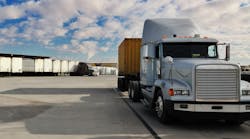Roeth: CARB and engine manufacturers' Clean Truck Partnership good for zero-emission future
Collaboration is something I have long advocated, especially when it simplifies a complex issue. That’s why I was happy to read about the new agreement between the California Air Resources Board (CARB) and leading truck manufacturers and the Truck and Engine Manufacturers Association. The initiative is being called the Clean Truck Partnership.
When it comes to regulations, you can regulate technologies that are fading out, or you can regulate future technologies. CARB and the federal government have been doing both. NOx and PM emissions levels have remained constant since 2010, continuing to be regulated. Several years ago, CARB wanted to move to 0.02 NOx emissions down from 0.2. However, the EPA, thought that was too drastic of a change, so it looked like we were headed to a scenario in which we would have to have two separate truck engines—one for California and one for the rest of the country.
With new agreement, there will only be one engine standard for the country. This is good news for the future of clean transportation because it will allow the truck and engine companies to devote more resources to research and development efforts related to zero-emission and alternative-fuel vehicles.
See also: Clark: Prepare today to service the vehicles of tomorrow
I am sure there are some NGOs out there wringing their hands saying this is a step backward when it comes to clean transportation. I would argue that this agreement frees up resources that can be deployed to work on zero-emissions solutions. Yes, there still will be NOx and PM emissions from today’s diesels and the diesels that will be purchased in the future. However, the more research and development efforts we can focus on battery-electric vehicles, hydrogen fuel cells, hydrogen internal combustion engines, and engines powered by renewable diesel, renewable natural gas, and biodiesel, the sooner we can replace diesels with cleaner-burning powertrains.
The Clean Truck Partnership is a great example of government and industry working together to come up with a solution that addresses the real-world constraints of engineering and manufacturing heavy-duty trucks. I hope we will continue to see collaborations like this into the future.
Michael Roeth has worked in the commercial vehicle industry for nearly 30 years, most recently as executive director of the North American Council for Freight Efficiency (NACFE). He serves on the second National Academy of Sciences Committee on Technologies and Approaches for Reducing the Fuel Consumption of Medium and Heavy-Duty Vehicles and has held various positions in engineering, quality, sales, and plant management with Navistar and Behr/Cummins.




